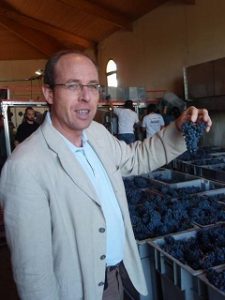Name: Philippe Blanc
Country: France

Currently: Director at Chateau Beychevelle
Website: www.beychevelle.com
Questions:
Please, tell us about how you got into wine, the wine industry and how your career developed?
I am graduate from Paris School of Agronomy (Institut National Agronomique Paris-Grignon) and decided to specialize in viticulture and oenology (graduate oenologist, DNO) in Agronomy School of Montpellier. It was in 1987. I spent 6 months in Epernay with Moet and Chandon in order to write essay (thesis) on red wine making in Champagne to know more on the process of mastering colour in the process of making Champagne Rosé. Then I started as a young professional in East of France working with Grands Chais de France in Petersbach. This experience lasted 6 months as I managed to get a job in Australia, working as vineyard manager of Taltarni vineyards in Victoria under control of Dominique Portet. I was sparkling wine winemaker of the Tasmanian operation called Clover Hill in Launceston area. This Down Under period was very rich and lasted for 4 years between 1998 and 1993. I was asked by Taltarni owner to be back to France end of 1993 but the project he had in mind collapsed and I had to start finding a job. I was hired for a quite different type of business, liquor making, in the south west town of Agen where a company called L&L was producing a Passion fruit liqueur called Alize. For 18 months, we worked like crazy as the success was impressive. So it was a very interesting experience. In 1995, I applied, thanks to a friend of mine, for a position of General manager at Chateau Beychevelle and with a bit of luck and maybe surprise, I was hired by Mr Aymar de Baillenx as my predecessor left the position in mid 1996. So I have been in charge of Chateau Beychevelle since then and it has been a great period of time while we have worked hard to improve and to come back on track with the great properties of St Julien and Medoc.
What is your philosophy to making wine and viticulture?
I think it is a great privilege to be in charge of such a beautiful property with such a goodwill and fame. So the philosophy is to consider the hundreds of stages that lead to making a wine and try to work out how to fine-tune these and improve by little notches in order to climb one step at the end. It is a very slow process and you have to be patient. But as a marathon runner, I do not mind starting slowly and to fight for long time without giving up. We did a big job in the vineyard where a lot of efforts had to be implemented. We changed views on viticulture as well: canopy management, crop reduction, fruit exposure, no insecticides (1997), no miticide (1996), giving up herbicides (2008), developing organic viticulture (2008) on a small scale first 6 ha and increasing it step by step albeit difficulties in Bordeaux conditions for this very technique (35 ha now). I think essential to conduct a really environmental friendly viticulture as leaders of the industry. As far as winemaking is concerned, we try to make elegant wines, non over extracted with finesse and silky tannins. That does not make the biggest wines but that the style we appreciate.
Which cultivar is your favourite to work with and why?
In Saint Julien we grow four of them : Cabernet Sauvignon, Merlot, Cabernet Franc and Petit Verdot. I firmly believe in the interest of blending so one varietal is not enough! I think that in good years, Cabernet Sauvignon is the epitome of red wine making. Merlot is quite good though and Petit Verdot is very interesting to vinify. Cabernet Franc is maybe here a varietal that is in danger of being reduced to nil.
How do you see the future of wine production and what are the challenges and the opportunities?
I am so far very confident in the future of making great wines in Crus Classés. The demand remains very high worldwide and more and more people are interested in great wines. The risk exists as they can be political between countries where we export and France, movements willing to reduce alcohol consumption at all costs are gaining in strength in France and are a threat for wine producers. Climatic disorders could impair quality of our wine or reduced their ability to become elegant and balanced. On the other hand, perfect maturity is reachable far more often than before and therefore we can make great quality wines. Labour issues can also be major challenges for our industry in the future.
Where do you see the global wine market in 2025?
Production wise not with too many changes but if global warming is well confirmed it could reduced some production sites on the south of Europe and maybe some places in Australia and California. On the other hand one could see some new good wine production areas like in England, maybe in some places of Eastern Europe or China.
For consumption Asia demand will keep growing and we are very confident that demand for great wines has a bright future.
Philippe Blanc
@ by Dominik Kozlik – Zeitgeist Sommeliers – International Sommelier Positions – www.sommelier-jobs.com

Dominik Kozlik e.U.
78/12 Gruberstr.
4020 Linz, Austria